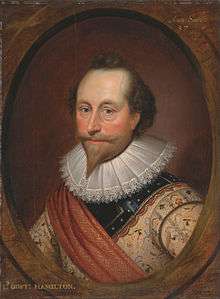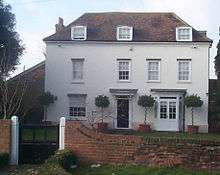Alexander Temple
Sir Alexander Temple (bapt. 9 February 1582/3 – 1629) was an English landowner and Member of Parliament. He was born at Stowe House in 1583 and knighted in 1603. During his life he held many public offices, including MP for Sussex. He was buried in Rochester Cathedral.
Sir Alexander Temple | |
|---|---|
 Sir Alexander Temple by Cornelius Johnson | |
| Born | 1583 Stowe House, Buckinghamshire |
| Died | 1629 |
| Occupation | Landowner |
| Spouse(s) | (1) Mary Penistone (nee Sommer); (2) Margaret Griffin; (3) Mary Bankworth (formerly Busbridge nee Reve) |
| Children | 3 |
| Parent(s) | John Temple, Susan (nee Spencer) |
Family

Temple was born at Stowe House, the fourth son of John Temple and Susan Spencer) and was baptised on 9 February 1582/3.[1] He was the brother of Sir Thomas Temple and the brother-in-law of Viscount Saye and Sele.
In 1602 he married Mary Penistone (née Sommer) of Rochester Kent. They had three children:
- * John, killed at the Isle of Rhe;[2]
- * James Temple, the regicide;
- * Susan or Susanna Temple, maid of honour to Anne of Denmark, who married (1) Sir Gifford Thornhurst of Agney Court, Kent, and (2) Sir Martin Lister. Through her first marriage, Susan was grandmother of Sarah Jennings, Duchess of Marlborough. Her portrait was painted by Cornelius Johnson.[3]
As a result of this marriage, Temple gained four step children including Sir Thomas Penistone
Temple was knighted at the Tower of London by James I following the King's accession to the English throne - one of many members of the gentry who were knighted during the first years of the King's reign.[4]
Following the death of his first wife, Sir Alexander moved to Chadwell St Mary in Essex.
In the early 1620s, he married Mary Bankworth (who was previously married to John Busbridge), and moved to Haremere Hall in Etchingham, Sussex.[5]
Temple died in 1629 and was buried in Rochester Cathedral.
Education
Temple was probably admitted to New College, Oxford in 1599.[6] He was admitted to Lincoln's Inn in April 1600.[7]
Public Offices
In 1604, Temple was elected as an assistant warden of the Rochester Bridge Trust. He continued to serve on the court in various roles for the following eleven years. Temple was chosen as the senior warden in 1606 and the junior warden in 1612.[8]
Temple was nominated as MP for Boston in 1621, but lost out to Sir Thomas Cheeke.[1] In 1624, Temple tried to take the Winchelsea parliamentary seat from the control of the Finch family and succeeded in having John Finch's return invalidated. However Temple was defeated in the subsequent by-election.[9][10]
In 1626, Temple was elected to the 2nd Parliament of King Charles I as MP for Sussex. Temple made six recorded speeches during this parliament. He was also appointed to 39 committees.[1]
References
- History of Parliament
- Cogswell, Thomas. "The Human Comedy in Westminster". Journal of British Studies. 52 (April, 2013): 370–389.
- J. Granger, A Biographical History of England, vol. 1 part 2 (London, 1769), p. 554.
- Shaw, William Arthur; Burtchaell, George Dames (1906). The Knights of England. A complete record from the earliest time to the present day of the knights of all the orders of chivalry in England, Scotland, and Ireland, and of knights bachelors, incorporating a complete list of knights bachelors dubbed in Ireland. Sherratt and Hughes. p. 130. ISBN 0-8063-0443-X.
- Matthews, John. "Two Thurrock Regicides". Thurrock Local History Society. Retrieved 5 August 2009.
- Education of an Elizabethan Gentleman, John Matthews
- Lincoln's Inn Admission Register. 1. Lincoln's Inn. 1896.
- Traffic and Politics: Construction and Management of Rochester Bridge. The Boydell Press. 1994.
- Robert E. Ruigh The Parliament of 1624: politics and foreign policy
- Willis, Browne (1750). Notitia Parliamentaria, Part II: A Series or Lists of the Representatives in the several Parliaments held from the Reformation 1541, to the Restoration 1660 ... London. pp. 229–239. Some sources attribute the 1624 Winchelsea seat to John Finch recorder of Canterbury and later Speaker
| Parliament of England | ||
|---|---|---|
| Preceded by Sir Thomas Pelham, 2nd Baronet Sir John Shurley |
Member of Parliament for Sussex 1626 With: Walter Covert |
Succeeded by Sir William Goring, 1st Baronet Richard Lewknor |